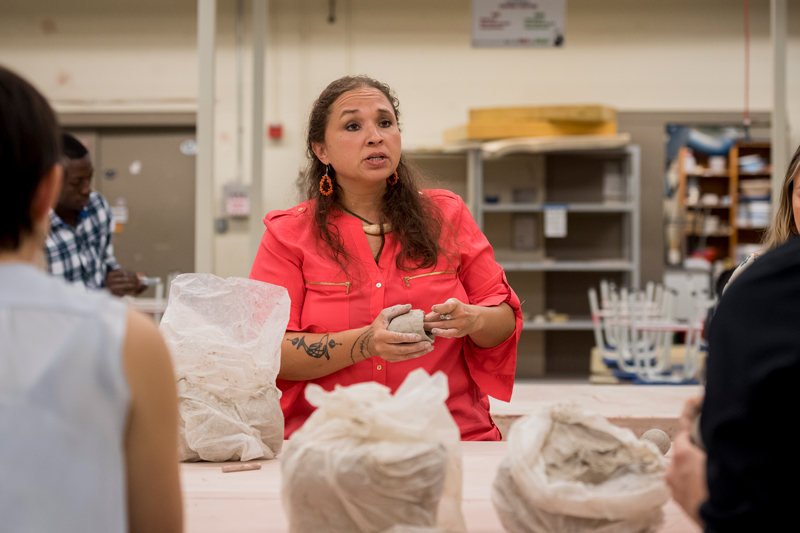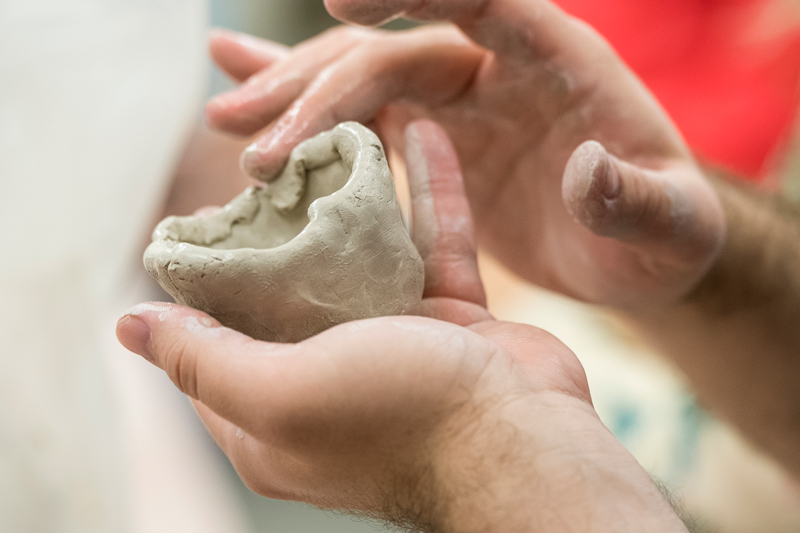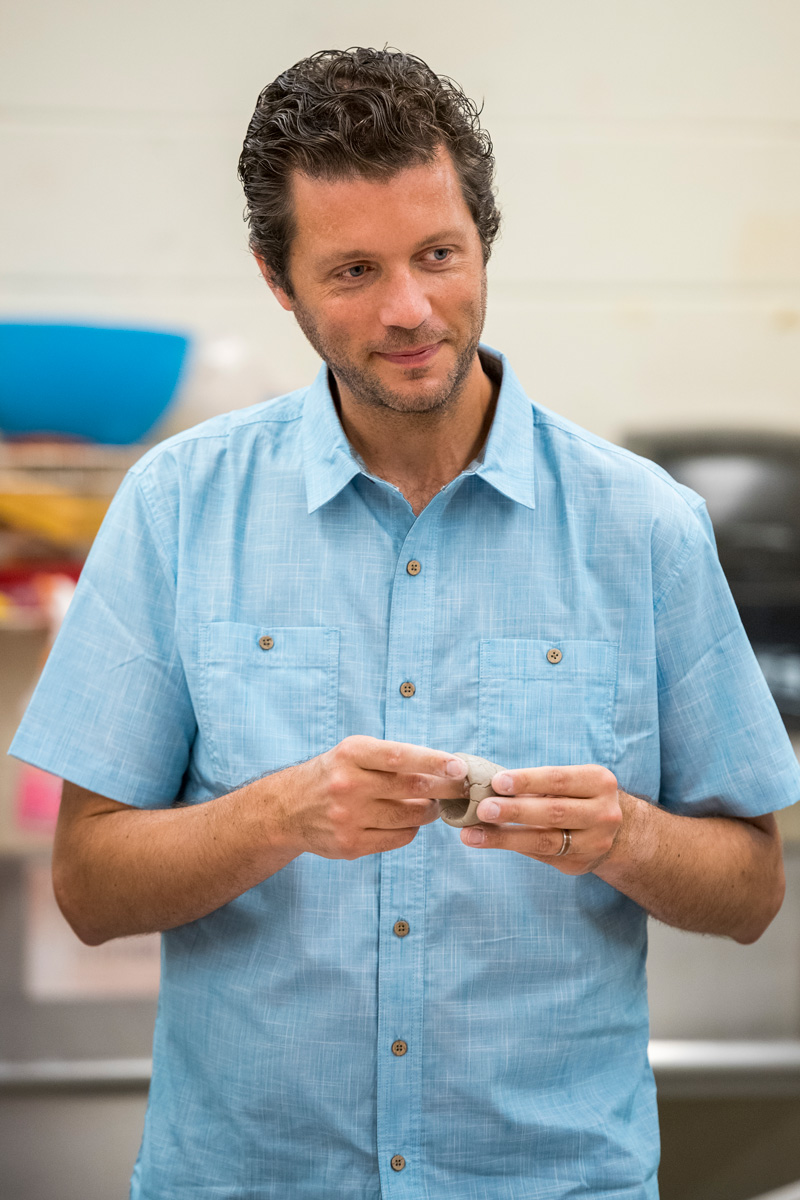


Inspired by weather
Photos by Kathy F. Atkinson November 01, 2019
Innovative graduate seminar explores a variety of perspectives
Everybody may talk about the weather, as the saying goes, but few are likely to have thought about it in as many and varied ways as the students in an experimental graduate seminar at the University of Delaware.
Cross-listed in the departments of English and Art History, and part of UD’s environmental humanities initiative, the course explores aspects of weather from perspectives that include meteorology, literature, art, poetry, history, environmental justice and the erosion of cultures.
“I’m interested in the connection between humans and weather, how humans are inspired by the atmosphere in literature and art and philosophy,” said Lowell Duckert, associate professor of English, who leads the course that was co-designed by students.
“I want the class to not just be about poetry or novels in which weather is a feature. I want a class that has a proliferation of possibilities and asks: How does the turn to physical weather and the process of weathering help us think critically about a multitude of issues?”

Each class session focuses on a particular topic and features guest speakers, field trips or experiential-learning activities. Students are reading nonfiction books about the science of weather and the history that led to today’s high-tech forecasting systems, as well as Shakespeare’s King Lear and Jesmyn Ward’s Salvage the Bones, a novel centered on Hurricane Katrina.
In early October, for a session with the topic “Shorelines,” the class traveled to Fort DuPont State Park in Delaware City to hear from Emma Ruggiero, a graduate student in UD’s College of Agriculture and Natural Resources and an intern with the Coastal Resilience Design Studio. Ruggiero has developed a master plan for Fort DuPont that proposes innovative solutions to sea level rise and soil erosion at the park.

Other guest speakers in October included Arizona State University Dean of Humanities Jeffrey Jerome Cohen and Julian Yates, who is H. Fletcher Brown Professor of English at UD, who both talked about “arks” and the concept of refuge.
For another recent class meeting, Duckert invited Courtney M. Leonard to talk to the class about her work as a ceramics artist who also explores her Native American culture as a member of the Shinnecock Indian Nation on Long Island, New York. Her art reflects that coastal environment and the Shinnecocks’ historical ties to water and the ocean’s resources.
A self-identified eco-artist, Leonard described the influence of the environment on her work as well as the effects that weather has on vulnerable communities, from Long Island to the desert of the U.S. Southwest, where she now lives and works. Just as weather events can erode the physical environment, indigenous culture has often been eroded as well, she said.
Students accompanied Leonard to UD’s ceramics studio and learned some of her techniques by forming clay into small pots.
“I really appreciated Courtney Leonard's insight and the fact that we were able to partake in her creative process by handling the matter ourselves, giving shape to the clay,” said Thomas Busciglio, an art history doctoral student enrolled in the seminar.
“I rarely have the opportunity to meet contemporary artists, since my research focuses on the 19th century. And Courtney Leonard's practice is connected to important environmental issues, which made her intervention all the more relevant.”
In November, students will spend the “Archive” class session visiting Special Collections in Morris Library and the UD Disaster Research Center (DRC).
Senior assistant librarian John Caldwell will talk about the 1962 Ash Wednesday storm that severely damaged Delaware’s coast, and the DRC’s A.R. Siders, assistant professor of public policy and administration, will talk about coastal evacuation plans along the Eastern Seaboard.
In other sessions in November, the class will hear from a visiting historian who has written about the Little Ice Age and its effects on the Europeans’ first arrivals in North America, and a visiting professor of English who has written about the weather in King Lear.
These wide-ranging topics are all designed to inspire students to think in new ways and across disciplines, Duckert said.
“If your emotions and your imagination are tied to the weather, how does this inform your thinking?” he asked as one of the questions the seminar explores. “The arts and the sciences are not inherently separate. Collaboration—that’s where you do your best work.”
From Busciglio’s perspective, the seminar has been successful.
“My research will most likely involve a whole range of methods like ecocriticism, environmental studies and material studies,” he said. “I wanted to be more familiar with these approaches, and Professor Duckert’s class is a good way to accomplish this in an interdisciplinary manner, combining art, literature and science.”
More about this type of graduate course
The graduate seminar “Weather” is an example of what the Department of English calls “colloquies” or conversation-centered seminars that are co-designed by graduate students.
“This type of course puts interdisciplinary conversation at the center of the seminar experience,” said Siobhan Carroll, associate professor of English and the department’s director of graduate studies.
“We want students in these courses to be exposed to ideas and experiences that they would not ordinarily come across if they stayed inside the traditional boundaries of their disciplines.”
A previous seminar of this type, “The Black Atlantic and the Archive,” led by Laura Helton, assistant professor of English, was offered in fall 2018. That course resulted from interdisciplinary conversations that were generated by UD’s African American Public Humanities Initiative.
Carroll said the department plans to offer more of these innovative seminars.
“We believe that to produce cutting-edge scholarship we need to create open, engaged spaces for intellectual community, in which students and faculty from different disciplines can learn from each other,” she said.
A Unidel Grand Challenge Grant supported the planning of the “Weather” course. Other funding came from the departments of English, History and Art History.
Contact Us
Have a UDaily story idea?
Contact us at ocm@udel.edu
Members of the press
Contact us at 302-831-NEWS or visit the Media Relations website

